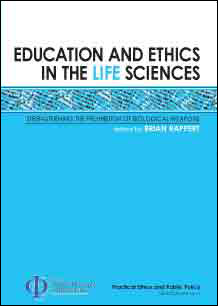The Life Sciences, Biosecurity, and Dual Use Research
A major plank of policy responses in relation to this has been devising educational and awareness training for scientists regarding the 'dual use' potential of research -- its potential to be used for both beneficent and malevolent purposes. Yet, that overall agreement is belied by the lack of specification about the content and specific aims of such provisions. Should that, for instance, consist of providing information on the history of biological warfare, stimulating generic concerns about the responsibilities of scientists today, alerting researchers to security considerations for their individual consideration, or challenging certain presumptions about the malign potential of research?
First as part of a grant funded by the Economic and Social Research Council and more recently through three Alfred P. Sloan Foundation grants, Malcolm Dando (University of Bradford) and Brian Rappert (University of Exeter) are conducting seminars for practising researchers. There are two aims to this: one, to inform participants about current biosecurity ‘dual use’ debates and second, to generate interactive discussion about the merits of proposed policy responses. Working with a wider range of individuals and organisations, we have conducted over 100 of these seminars with researchers in countries such as the UK, the US, South Africa, the Netherlands, Finland, Japan, Israel, Uganda, Ukraine, Kenya, Switzerland, Australia, Argentina, Germany, India, and Australia. With our collaborators, we are now working to build up from these activities to develop national educational provisions and polices.
Through this work we are developing a novel research method for engaging
with practising scientists about emerging areas of societal discussion.
We have also produced interactive educational
material, in part, in collaboration with Marie
Chevrier (University of Texas at Dallas).


